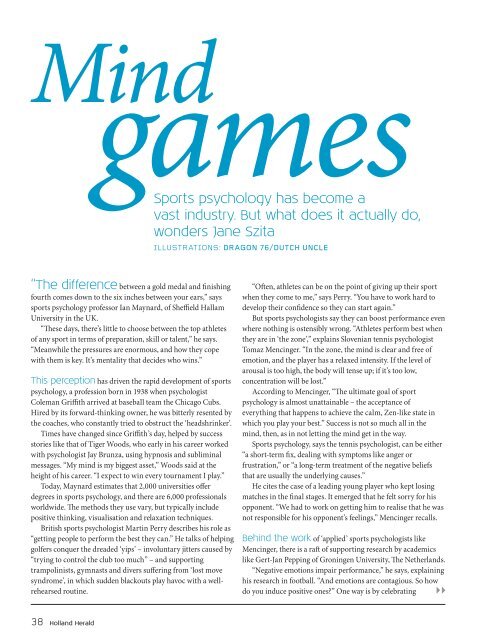june-2012
june-2012
june-2012
Create successful ePaper yourself
Turn your PDF publications into a flip-book with our unique Google optimized e-Paper software.
Mind<br />
games<br />
Sports psychology has become a<br />
vast industry. But what does it actually do,<br />
wonders Jane Szita<br />
“The difference between a gold medal and fi nishing<br />
fourth comes down to the six inches between your ears,” says<br />
sports psychology professor Ian Maynard, of Sheffi eld Hallam<br />
University in the UK.<br />
“Th ese days, there’s little to choose between the top athletes<br />
of any sport in terms of preparation, skill or talent,” he says.<br />
“Meanwhile the pressures are enormous, and how they cope<br />
with them is key. It’s mentality that decides who wins.”<br />
This perception has driven the rapid development of sports<br />
psychology, a profession born in 1938 when psychologist<br />
Coleman Griffi th arrived at baseball team the Chicago Cubs.<br />
Hired by its forward-thinking owner, he was bitterly resented by<br />
the coaches, who constantly tried to obstruct the ‘headshrinker’.<br />
Times have changed since Griffi th’s day, helped by success<br />
stories like that of Tiger Woods, who early in his career worked<br />
with psychologist Jay Brunza, using hypnosis and subliminal<br />
messages. “My mind is my biggest asset,” Woods said at the<br />
height of his career. “I expect to win every tournament I play.”<br />
Today, Maynard estimates that 2,000 universities off er<br />
degrees in sports psychology, and there are 6,000 professionals<br />
worldwide. Th e methods they use vary, but typically include<br />
positive thinking, visualisation and relaxation techniques.<br />
British sports psychologist Martin Perry describes his role as<br />
“getting people to perform the best they can.” He talks of helping<br />
golfers conquer the dreaded ‘yips’ – involuntary jitters caused by<br />
“trying to control the club too much” – and supporting<br />
trampolinists, gymnasts and divers suff ering from ‘lost move<br />
syndrome’, in which sudden blackouts play havoc with a wellrehearsed<br />
routine.<br />
38 Holland Herald<br />
ILLUSTRATIONS: DRAGON 76/DUTCH UNCLE<br />
“Oft en, athletes can be on the point of giving up their sport<br />
when they come to me,” says Perry. “You have to work hard to<br />
develop their confi dence so they can start again.”<br />
But sports psychologists say they can boost performance even<br />
where nothing is ostensibly wrong. “Athletes perform best when<br />
they are in ‘the zone’,” explains Slovenian tennis psychologist<br />
Tomaz Mencinger. “In the zone, the mind is clear and free of<br />
emotion, and the player has a relaxed intensity. If the level of<br />
arousal is too high, the body will tense up; if it’s too low,<br />
concentration will be lost.”<br />
According to Mencinger, “Th e ultimate goal of sport<br />
psychology is almost unattainable – the acceptance of<br />
everything that happens to achieve the calm, Zen-like state in<br />
which you play your best.” Success is not so much all in the<br />
mind, then, as in not letting the mind get in the way.<br />
Sports psychology, says the tennis psychologist, can be either<br />
“a short-term fi x, dealing with symptoms like anger or<br />
frustration,” or “a long-term treatment of the negative beliefs<br />
that are usually the underlying causes.”<br />
He cites the case of a leading young player who kept losing<br />
matches in the fi nal stages. It emerged that he felt sorry for his<br />
opponent. “We had to work on getting him to realise that he was<br />
not responsible for his opponent’s feelings,” Mencinger recalls.<br />
Behind the work of ‘applied’ sports psychologists like<br />
Mencinger, there is a raft of supporting research by academics<br />
like Gert-Jan Pepping of Groningen University, Th e Netherlands.<br />
“Negative emotions impair performance,” he says, explaining<br />
his research in football. “And emotions are contagious. So how<br />
do you induce positive ones?” One way is by celebrating

















